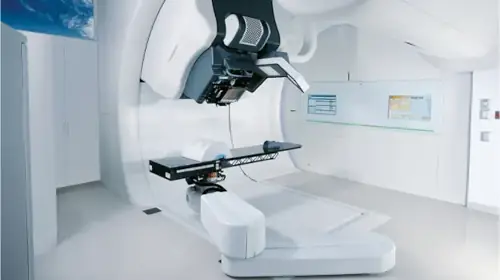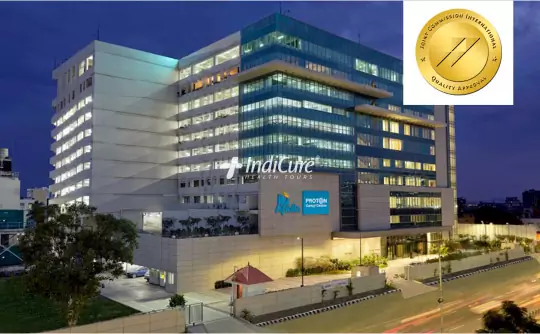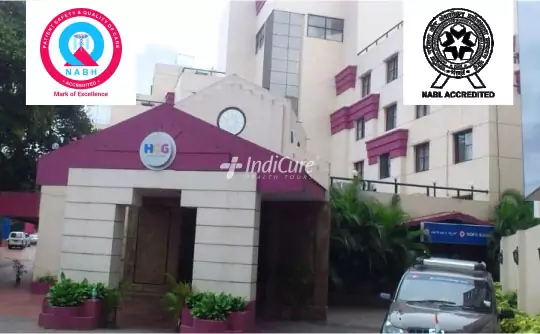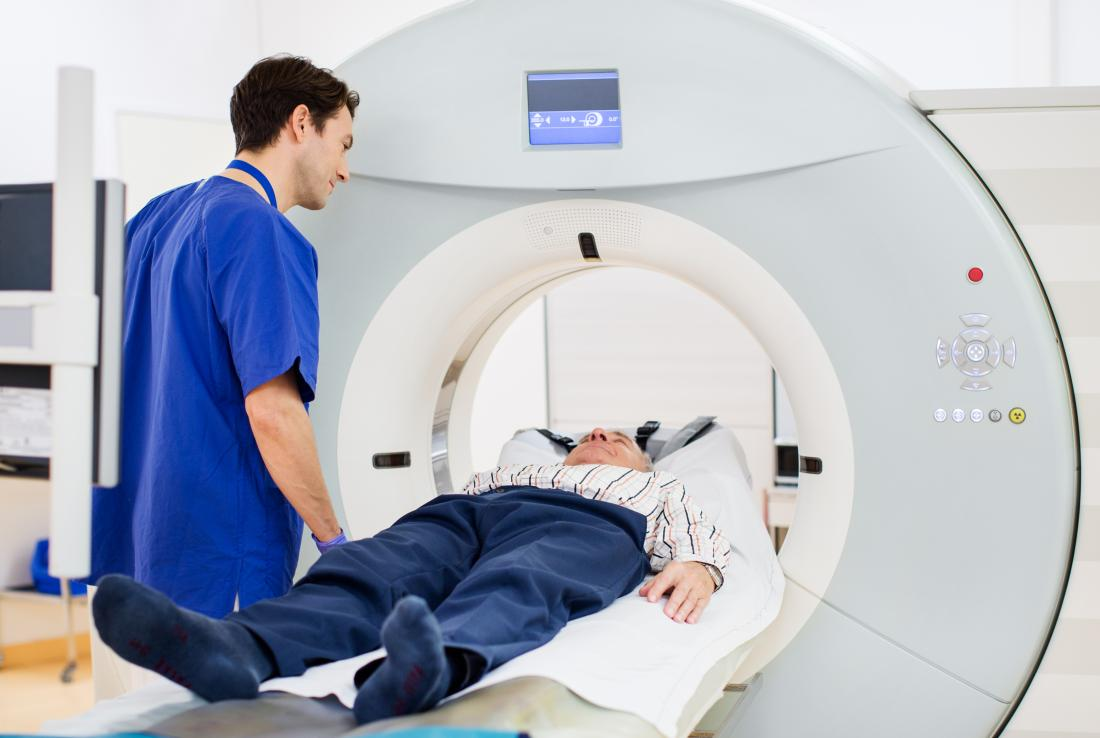

Proton Beam Therapy Cost in India starts from US $65,000 and varies depending on your medical history and health condition, area and stage of the cancer you are suffering from, your treating doctor's seniority and experience, hospital and the city where you choose to get the treatment done.
In fact, we have Special Negotiated Rates with the Hospitals and you can avail Discounted Rates when you choose to Travel with IndiCure.


We Help you Choose the Right Treatment, Surgeon & Hospital

We Arrange Video/Telephonic Consultation with the Surgeon

We Assist you with Visa & Accommodation

We Receive you at the Airport and Drop you at Hotel/Hospital

We Assist you the at Hospital & Provide Post Operative Support

Chennai
The Apollo Proton Cancer Centre (APCC) is South Asia's and the Middle East's first and only proton therapy centre, as well as India's first JCI-accredited cancer hospital. The APCC includes a completely integrated treatment suite that provides the most advanced surgical, radiation, and medical procedures available. The Centre brings together a remarkable team of clinicians renowned globally in cancer care, in keeping with the Apollo Pillars of Expertise and Excellence.

Bangalore
HCG- HealthCare Global Enterprises Ltd, is the specialized chain of hospitals in cancer care headquartered in Bangalore. Founded by Dr. Ajaikumar, a renowned medical and radiation oncologist with 40 years of experience, HCG has 26 centres across India with its largest facility in Bangalore.
HCG Hospital Bangalore is not only the most advanced facility for cancer care in India, it is a Centre of Excellence for most advanced cancer care and research.
Proton therapy, also called proton beam therapy, is a type of radiation therapy that is used to kill tumor cells. Instead of using x-rays as in traditional radiation therapy, protons are used to send high-energy beams that can target tumors more precisely than X-ray radiation.
Doctors and physicists collaborate to focus the proton beam on the tumor's specific size and shape while treating a patient. The laser kills tumor cells layer by layer, preserving healthy tissue in the process.
Proton therapy is a type of sophisticated radiation therapy that uses protons rather than X-rays.
The beam of energy in traditional radiation therapy enters the body, passes through the tumor, and exits the other side. Beyond the tumor, this "exit dose" of radiation may have an effect on healthy tissue.
Protons, on the other hand, are larger than the particles utilized in normal radiation. They concentrate more of their power within the tumor.
The protons stop after giving the energy to the tumor: they do not exit the tumor and enter healthy tissue on the other side. Proton therapy lowers radiation exposure and potential harm to healthy tissue in sensitive places like the brain, eyes, spinal cord, heart, major blood arteries, and nerves in this way.
Cancer and some noncancerous tumors are treated using proton therapy. Proton therapy may be used as the only option for treating your disease, or it could be used in combination with other treatments including surgery and chemotherapy.
If the cancer persists or returns after standard X-ray radiation, proton therapy may be employed.
Proton beam therapy is sometimes used to treat the following conditions:
We at IndiCure completely understand your concerns and it is always our endeavor to provide the best outcome for every patient. Following is the list of questions you must ask before you embark on your journey for proton therapy in India.
Prepare to answer questions about your:

Proton therapy is usually done five days a week for several weeks. However, depending on your health, you may just need one or a few treatments in some cases. The proton therapy treatment itself may only take a few minutes, but plan on spending 30 to 45 minutes prepping for each session.
You may also get weekly CT scans to evaluate if your dose needs to be revised due to changes in your weight or the size and shape of your tumor.
You'll be seated at a table to prepare. To keep your body immobile, cushions and restraints will be employed.
Then, before each treatment, you'll have an imaging test, such as an X-ray or a CT scan, to ensure that your body is in the same precise position.
Proton treatment is delivered by an equipment known as a gantry, which directs proton beams at specific places on your body. When the machine is turned on and providing the proton treatment dose, you'll hear it. During your treatment, however, you will not be able to feel the radiation.
Periodic imaging examinations may be recommended by your doctor during and after proton therapy to see how well your cancer is responding to the treatments.
You can resume your normal routine after your therapy session is finished. You will not be radioactive and will not emit radiation.
Proton therapy side effects usually appear over time. At first, you may only suffer minor side effects. However, weariness may occur after numerous treatments, making you feel as if your normal activities require more energy or that you have little stamina for routine duties. In the area where the proton beams are aimed, you may observe a sunburn-like skin redness.
Protons and x-rays both kill cancer cells by destroying their biological structures. Protons, unlike x-rays, send the majority of the radiation dose to the cancerous tumor only without harming the healthy cells.
Proton therapy patients see less short- and long-term negative effects as a result of this.
The most common side effects of proton therapy are Fatigue, Hair loss (happens in the treated area of the body) and Skin that becomes reddish in the area of the body being treated.
You may feel weary after your session. The side effects of proton therapy are comparable to those of other types of radiation therapy. Because the approach involves less radiation exposure, adverse effects may be less severe than with regular radiation therapy. Headaches and eating and digestion issues are also possible adverse effects, depending on the area treated.
Proton therapy side effects in people with head and neck cancer can linger for two to three weeks after treatment. Maintain your healthcare provider's oral, pharyngeal, and skincare regimen, as well as a nutritious diet.
It normally lasts three to four weeks after your therapy ends, but can sometimes last up to three months.
Proton treatment patients were 46 percent cancer-free after three years, while normal radiation therapy patients were 49 percent cancer-free after three years. 66 percent of those who received proton therapy and 58 percent of those who received conventional radiation were still alive after three years.
Most patients resume their normal activities immediately after a proton treatment session. Many patients report experiencing effects from this therapy within 2-8 weeks.
Proton therapy does not cause pain, though certain patients with physical restrictions may experience discomfort due to placement.
Proton treatment is a non-invasive procedure and you do not feel any pain or sensation during or after the treatment. The majority of patients receive treatment across numerous sessions, with some therapies taking longer than others.
It only takes a few minutes to complete the therapy. Protons are accelerated and energy is created by a huge machine. This energy is focused into the body by the proton beam at the precise depth where the tumor is located. The gantry may travel around your body, allowing it to treat the tumor from a variety of angles.
The proton beam will not be felt as it enters the body or as it treats the tumor.
Regular and proton radiation therapy both destroy cancer cells' DNA, but proton therapy offers two major advantages: more energy directed on the tumor and less radiation harming neighboring healthy tissue.
Side effects may be milder because less healthy tissue is harmed by the radiation. Damage to fragile structures like the brain, heart, mouth, esophagus, and spinal cord could be reduced.
Proton treatment isn't suitable for many types of cancer. It's best for malignancies in delicate places where other treatments could harm good cells nearby.
Proton therapy apparatus and equipment are extremely sophisticated and expensive to manufacture and run, and thus the cost of proton therapy treatment is quite high.
After a proton treatment session, most people resume their normal activities right afterwards. Within 2-8 weeks, many people report seeing results from this therapy. The response of your tumor to proton therapy is determined by the type of cancer you have and where it is located in your body.
Ask your doctor about proton therapy as a treatment option if you've been diagnosed with cancer. Your doctor will assist you in determining whether or not this treatment is appropriate for you.
Pediatric malignancies with solid tumors are one of the categories that can benefit the most from proton therapy's clinical benefits. Pediatric cancer cure rates have risen to about 90% in the last few decades. As a result, children are particularly vulnerable to long-term negative effects from their medications later in life. Proton therapy uses less radiation to treat healthy tissue, lowering the danger.
Proton therapy is frequently combined with chemotherapy or other pharmacological treatments, as well as surgery.
The number of treatments required varies depending on the diagnosis, however they might range from 5 to 39.
Yes. Since 1988, the US Food and Drug Administration (FDA) has certified proton therapy as a safe and effective treatment.
Enhance your medical journey to India by availing these extra services.
Traveling abroad for medical reasons may be challenging. With our experience of over a decade and working with the best surgeons and top hospitals in India, we help make your medical tour easier and safer for you. We will guide you at every step of the way and make end-to-end arrangements for your surgery, travel, and stay.
Ramandeep Dhaliwal
I had great experience having rhinoplasty through Indicure. Dr. Ruchika from Indicure has helped me in finding best plastic surgeon, answering all my questions...
Read More
Joshua Archer
My name is Joshua Archer I'm from New Zealand, bay of plenty, kawerau I opted for the bypass surgery in January 2023 but planned it in advance for 28 September found IndiCure...
Read More
Kera Ren
Absolutely loved my experience with IndiCure - from first inquiring to meeting the surgeon pre op to my follow up post op. The surgeon was extremely approachable...
Read More
Andreana Paul
Had a wonderful experience. Visited India for my plastic surgery. From sending mails, airport pickup, comfortable accommodation and, to smooth hospital appointment booking...
Read More
Brandi Luce
I had the privilege of using Indicure's services for a cosmetic procedure that I had wanted for a long time but had always been apprehensive about. Ruchika helped me...
Read More
Jade M
Indicure Health Tours went above and beyond my expectations. They helped me with every aspect of my journey and were professional, kind and caring. I was...
Read More
The content on the website (www.indicure.com) is intended to be general information and is provided only as a service. All photographs on our website of before and after results are examples only, and do not constitute an implied or any other kind of certainty for the result of surgery.
Learn about IndiCure Health Tours' comprehensive editorial policy that strives to deliver trustworthy, helpful, relevant, accurate and people-first content on medical tourism in India.
It is not medical advice and should not be taken as medical advice. It should not be used to diagnose or treat a health condition and is in no way meant to be a substitute for professional medical care. You are advised to see a surgeon in person to assess what surgery may or may not accomplish for you.
It is also important to keep your expectations realistic and to understand that all surgical procedures carry risks and should never be taken lightly.